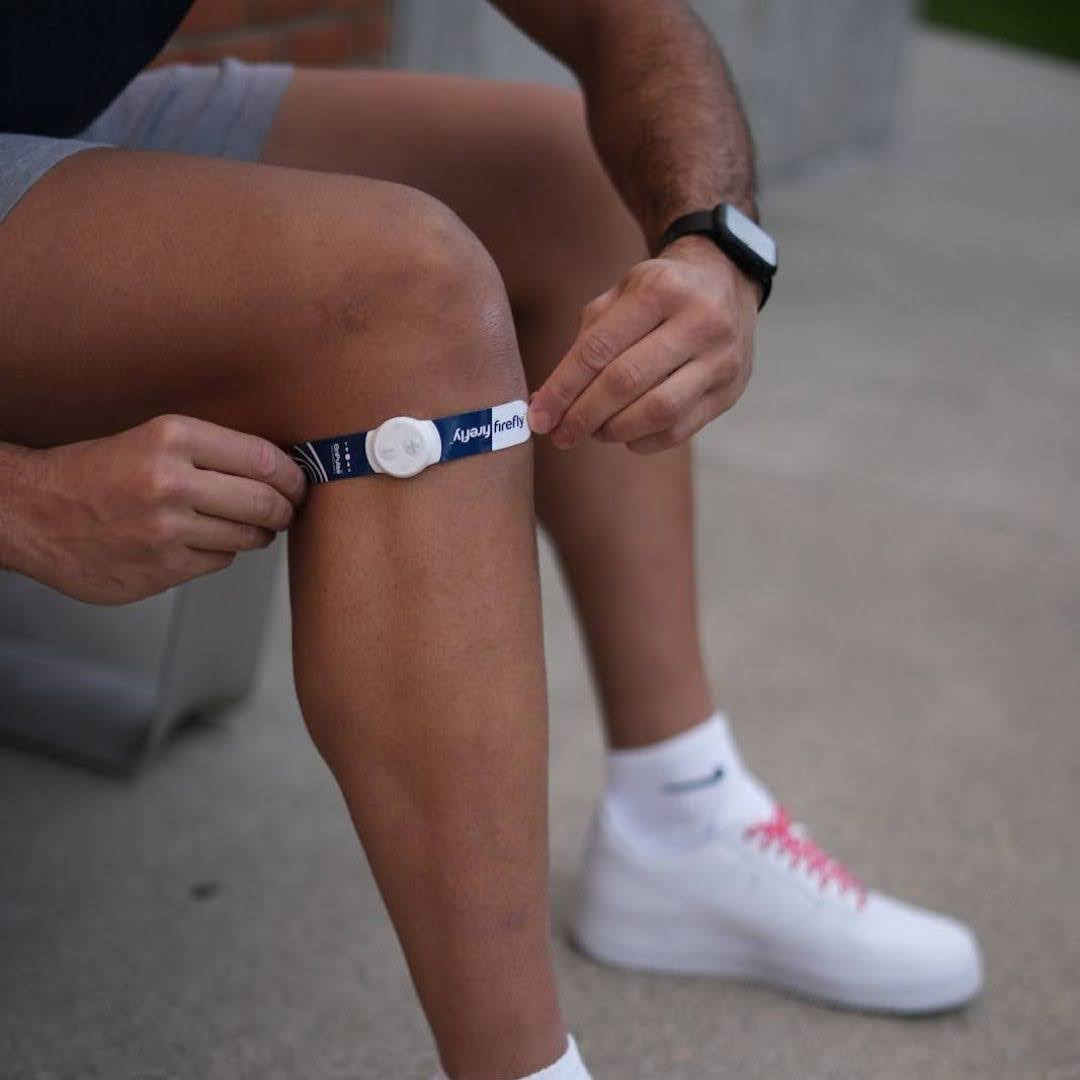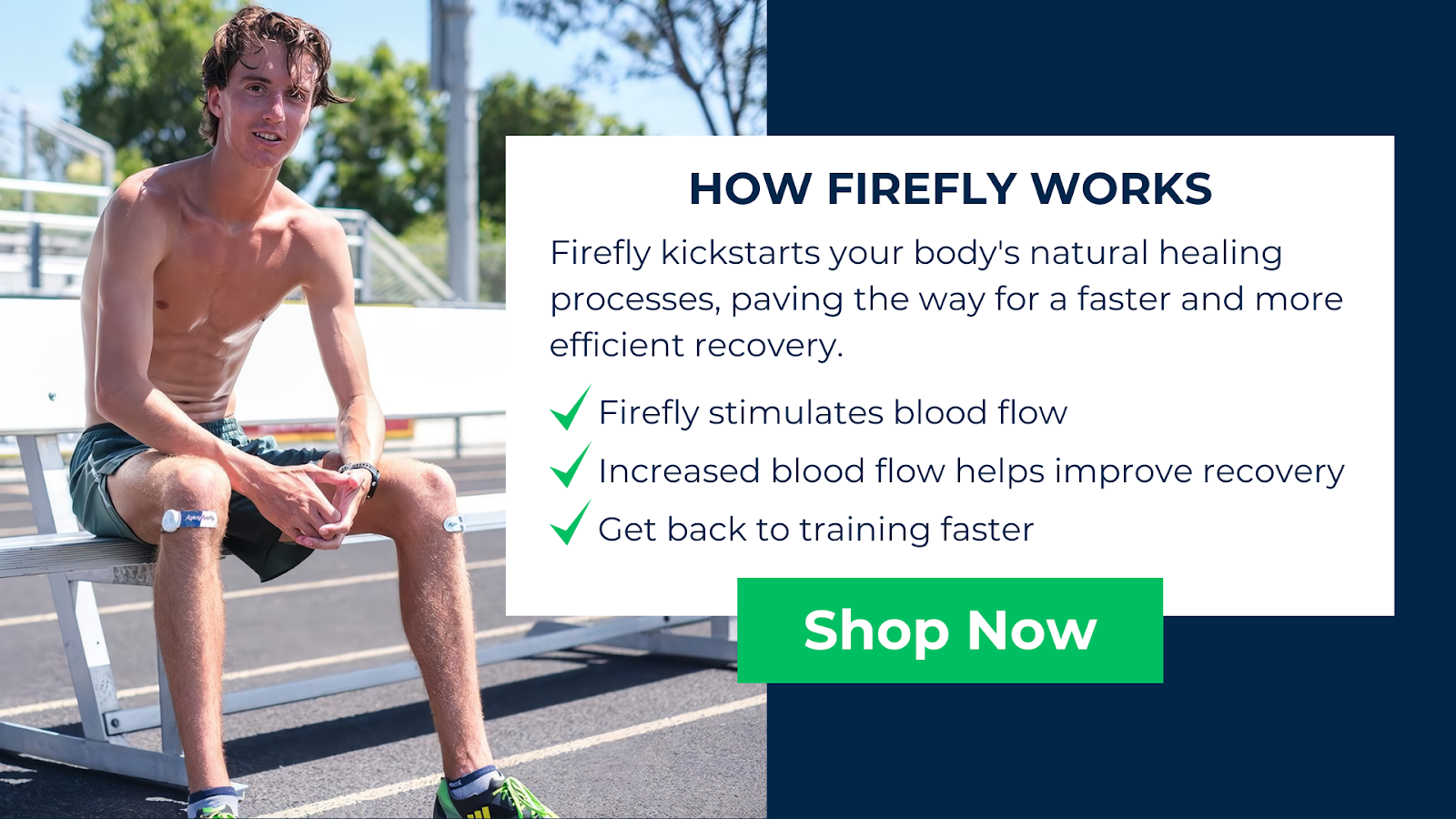Marathon Recovery Tips Every First Timer Should Know

Key Takeaways:
- Immediate Post-Marathon Care is Crucial: After completing a marathon, initiate recovery with hydration, nutrient replenishment, and gentle cool down exercises. This helps maintain circulation, reduces muscle stiffness, and aids muscle repair.
- Effective Hydration and Nutrition: Proper hydration with water and electrolyte solutions, along with a balanced diet rich in proteins, complex carbohydrates, and healthy fats, is essential for muscle repair, replenishing energy stores, and reducing inflammation.
- Utilize Modern Recovery Technologies: Incorporating tools like the Firefly Portable Recovery Device can enhance recovery by increasing blood circulation.
Congratulations on crossing the finish line! Completing a marathon is a significant achievement, reflecting your dedication, hard work, and resilience. But the journey doesn't end at the 26.2-mile mark; recovering from the marathon is just as crucial as the months of training leading up to it. As a first-timer, you might not be familiar with the toll such a long-distance race can take on your body. It's important to implement effective recovery strategies to ensure you bounce back stronger and healthier.
In this article, we'll dive into essential marathon recovery tips. Whether you aspire to run another marathon or just want to return to your daily activities without discomfort, these guidelines will steer you toward a speedy and efficient recovery, just like the experiences of our professional athletes at Firefly. Let's help you take the best steps forward in your post-marathon journey.
Understanding Your Body After A Marathon
Completing a marathon is a monumental achievement, but it's also extremely taxing on your body. Post-race, it's crucial to understand the signals your body is sending and respond appropriately to support recovery. Here’s what typically goes down in your body after crossing the finish line:
- Muscle Fatigue and Soreness: It’s no surprise that running 26.2 miles can lead to muscle fatigue. Your muscles have endured thousands of repetitions from pounding the pavement. Muscle soreness and stiffness are usually at their peak between 24 to 72 hours after the marathon. This occurs due to micro-tears in the muscle fibers, a normal outcome of intense physical activity.
- Systemic Inflammation: In addition to local muscle soreness, the body often experiences overall inflammation as an immune response to the microscopic muscular injury. This might manifest as general fatigue, swelling in the legs, or even flu-like symptoms, which can be unsettling but is fairly common among marathoners.
- Glycogen Depletion: Carbohydrates are stored in your muscles and liver as glycogen, and they're your body's preferred energy source during prolonged exercise. After a marathon, your glycogen reserves are likely depleted. Feeling exhausted or having a foggy brain are indicators that your body needs to refuel.
- Hydration and Electrolyte Imbalance: Sweating for several hours can lead to a significant loss of fluids and electrolytes. Dehydration and imbalances in electrolytes like sodium and potassium can contribute to cramps and dizziness.
It's crucial to give your body the tools it needs for efficient recovery. Leveraging professional advice from health experts and utilizing appropriate recovery tools can greatly enhance this process. Devices like Firefly, backed by professional athletes and health experts, are designed to address these post-marathon recovery needs efficiently. Through understanding and taking the appropriate measures, you can help your body bounce back more quickly and effectively, gearing you up for your next athletic challenge.
The Importance Of Immediate Post-Marathon Care
Completing a marathon is a monumental achievement that demands not only physical prowess but also strategic recovery practices to prevent injuries and ensure long-term health and performance. Immediate post-marathon care is crucial because the minutes and hours following such an intense endeavor are pivotal for the body’s recovery process.
First and foremost, initiate your recovery with hydration and nutrient replenishment. The body loses a significant amount of fluids and electrolytes during a marathon. Rehydrating with water, and possibly an electrolyte solution, is essential to restore balance and support cellular function. Additionally, consuming carbohydrates and protein soon after finishing can help repair muscle tissues and replenish energy stores.
Next, consider gentle cooldown exercises like walking or light stretching. These activities can help maintain circulation, reduce muscle stiffness, and clear out lactic acid buildup. While it’s tempting to plop down and rest right after crossing the finish line, spending a few minutes on light physical activity will set the stage for a smoother recovery.
Moreover, leveraging modern recovery technologies can dramatically enhance your post-marathon recovery process. Products like Firefly, designed with input from our elite Firefly Advisory Board, harness cutting-edge technology to facilitate faster recovery. These devices are crafted to increase blood circulation, thereby accelerating the removal of metabolic waste and enhancing the delivery of nutrients to tired muscles, allowing for a quicker return to training and everyday activities.
Focusing on immediate post-marathon care not only minimizes potential discomfort and injuries but also lays the groundwork for sustained athletic performance. By attentively addressing your body’s needs right after the finish line, you set yourself up for success in future endeavors—whether you’re a weekend warrior or a hopeful Olympian dedicated to continually pushing your limits.
Hydration: What And How Much To Drink
Post-marathon recovery begins with rehydration. Your body loses a significant amount of fluids and electrolytes during the grueling miles of a marathon. Proper hydration is key to aid in muscle repair and balance your body's electrolytes, which can prevent post-race cramps and reduce overall muscle soreness.
What To Drink?
Immediately following the marathon, start by sipping water. Once you can tolerate fluids, incorporate drinks that contain electrolytes such as sodium and potassium. These are crucial for replenishing what you've lost through sweat. Options like a sports drink can be beneficial, but be wary of those with high sugar content as they can lead to further dehydration.
For a more natural approach, coconut water is an excellent choice. It's packed with potassium, magnesium, and sodium, all of which are vital for effective recovery. Additionally, tart cherry juice is not only refreshing but can reduce muscle inflammation and soreness due to its high antioxidant content.
How Much To Drink?
The amount of fluid needed can vary based on individual sweat rates, the climate during the marathon, and pre-race hydration levels. A general rule is to drink until your urine is a light straw color. This usually means consuming roughly 500-700 ml (about 17-24 oz) of fluid for every pound of body weight lost during the race.
It's important to rehydrate gradually. Drinking too much water too quickly can lead to hyponatremia, a condition where blood sodium levels become dangerously low. Sip slowly and consistently instead of guzzling large amounts at once.
Implementing effective hydration strategies is essential for optimum recovery and performance in your next race. Consider also integrating a Firefly Portable Recovery Device into your recovery plan. Many Olympians use Firefly to facilitate faster recovery by enhancing blood circulation, further aiding in efficient hydration and nutrient distribution throughout the body.
The Role Of Nutrition In Recovery
Proper nutrition is a cornerstone of effective marathon recovery. It’s not just about refueling your body; it’s about providing it with the essential nutrients needed to repair muscle, replenish energy stores, and reduce inflammation. Following a marathon, your body undergoes a significant amount of stress, and how you feed it can either enhance or hinder your recovery process.
Firstly, protein is crucial for muscle repair. After depleting your reserves over the course of those 26.2 miles, consuming a protein-rich meal or shake within 45 minutes post-marathon can significantly aid in muscle recovery. Look for sources like whey protein and lean meats or plant-based options such as quinoa and tofu, which provide essential amino acids that help to patch up the small tears in muscle fibers caused by prolonged running.
Carbohydrates are also vital. They replenish the glycogen stores that have been exhausted during your run. Opt for complex carbohydrates such as whole grains, fruits, and vegetables which provide not only a quick energy return but also vitamins and minerals that aid in overall recovery. Sweet potatoes, oatmeal, and rice are excellent choices that offer both nutritional value and comfort to a spent body.
Equally important are fats. Yes, fats! They get a bad rap, but healthy fats are essential, especially for reducing inflammation—an inevitable aftermath of marathon running. Incorporate sources of omega-3 fatty acids like salmon, almonds, and chia seeds into your recovery diet to help alleviate inflammation and promote healing.
Additionally, hydration plays a pivotal role in the recovery process. It's important to replenish fluids and electrolytes lost through sweat. Aim to drink a mixture of water and electrolyte-rich drinks to accelerate recovery. Fluids help transport nutrients to your cells and keep all systems functioning optimally.
In summary, thoughtful nutrition substantially supports your recovery. By choosing the right foods and maintaining proper hydration, you're not just recovering; you're investing in your body’s long-term performance and resilience. This strategic approach to nutrition ensures that you bounce back stronger and are ready for your next challenge.
Managing Post-Marathon Pain And Discomfort
After crossing the finish line of your first marathon, it's not uncommon to experience varying degrees of pain and discomfort. This can range from general muscle soreness and fatigue to more acute muscle cramps and joint pain. Managing this post-marathon pain is crucial for effective recovery and to ensure you can get back to running and training safely.
Firstly, it's important to engage in gentle, post-race activities that aid in gradually decreasing your heart rate and promoting circulation. Simple actions like walking or slow stretching can be beneficial. Post-marathon, your muscles are in desperate need of attention to prevent stiffness and facilitate recovery. Implementing dynamic stretches that lightly work your muscles can significantly aid in alleviating some of the post-run tightness.
Hydration is another key element in managing post-marathon discomfort. Dehydration can exacerbate muscle soreness, so it's crucial to replenish fluids consistently after the race. Electrolyte solutions or drinks that include sodium, potassium, and other minerals can help restore balance and aid muscle recovery.
For more targeted pain relief and quicker recovery, incorporating a device like Firefly can be particularly helpful. Designed with the professional athlete in mind but suitable for all levels of runners, the Firefly device uses neuromuscular electrical stimulation to increase blood circulation, not only helping to flush out lactic acid but also speeding up recovery times significantly. This kind of technology is backed by our team of experts at Firefly, including professional athletes and health professionals who understand the needs of post-marathon recovery.
Additionally, consuming anti-inflammatory foods such as cherries, berries, salmon, and walnuts, or supplements like omega-3 fatty acids, can help reduce internal inflammation and aid muscle recovery.
Remember, listening to your body's signals post-marathon is crucial. If pain persists or worsens, it's advisable to seek medical attention to rule out injuries such as stress fractures or severe muscle strains that might be masked by initial post-race adrenaline. By effectively managing your pain and discomfort, you're setting the stage for a quicker, more comprehensive recovery, enabling you to return to training with resilience and renewed vigor.
Final Thoughts
Completing a marathon is an extraordinary achievement, and how you manage the aftermath is crucial for your body's repair and future performance. By following these marathon recovery tips, you’re not only prioritizing your health but also setting the stage for better future runs. Remember, recovery is just as essential as training.
Incorporating a tool like Firefly into your recovery regimen can significantly reduce recovery time, making it an excellent choice for athletes at all levels. Designed with input from our Firefly Advisory Board—comprising elite athletes and top health professionals—Firefly ensures that you receive the most advanced recovery technology. Whether you're a weekend warrior striving for your next personal best or an Olympian fine-tuning your performance, integrating Firefly into your recovery process helps maintain your competitive edge.
After your marathon, celebrate your accomplishment and take care of your body with the best tools available. You’ve pushed your limits—now let Firefly help you bounce back faster, stronger, and ready for your next challenge.
Read also:
- The Marathon Is Over: Now Recover Quickly With This Guide
- Should You Push Through The Pain? A Look At Working Out With Sore Muscles
- Speed Up Your Marathon Recovery: A Guide To Getting Back On Track
Frequently Asked Questions On Marathon Recovery Tips For First Timers
How long should I rest after running a marathon?
Post-marathon, it's essential to allow your body to rest and recover. Generally, a minimum of 24-48 hours of complete rest is recommended. During this period, focus on gentle movements like walking or light stretching rather than jumping back into intense physical activities.
What are the best foods to eat after a marathon?
After a marathon, your body needs nutrients to repair muscle tissues and replenish spent energy. Ideal post-marathon foods include a mix of proteins, carbohydrates, and fats. Think lean proteins like chicken or fish, complex carbohydrates such as sweet potatoes or whole grains, and healthy fats like avocado and nuts.
Is it necessary to stretch after running a marathon?
Yes, stretching after a marathon can aid in recovery by improving flexibility and reducing muscle tightness. Focus on gentle, static stretches targeting major muscle groups like the calves, hamstrings, quads, and hips. Hold each stretch for 20-30 seconds, and avoid bouncing.
How much water should I drink post-marathon?
Hydration is crucial to recovery. Immediately after a marathon, aim to drink about 16-24 ounces of water. Continue drinking water and other fluids like electrolyte-replenishing beverages throughout the day to replenish lost fluids.
What are the signs of dehydration I should watch for?
Key signs of dehydration include dry mouth, fatigue, dizziness, and dark-colored urine. More severe dehydration symptoms are increased heart rate, confusion, or fainting. If you experience any of these signs, increase your fluid intake and consult a healthcare professional if symptoms persist.
When is it safe to start running again after a marathon?
The safe time to resume running after a marathon varies for each individual, depending on recovery progress and fitness level. Most runners can safely resume light running 3-7 days post-marathon, gradually increasing intensity based on how their body feels.
What techniques help reduce muscle soreness after a marathon?
Techniques such as ice baths, massage, compression garments, and using Firefly Recovery Portable Devices can effectively reduce muscle soreness. These methods help by decreasing inflammation, improving blood circulation, and facilitating the repair of muscle tissues. For best results, combine these techniques with proper rest, nutrition, and hydration.
Sources:
- Cho, Seung-Ik, et al. "Effects of a Rehabilitation Exercise Program Using Electro Muscle Stimulation following Anterior Cruciate Ligament Reconstruction on the Circumference, Activity, and Function of the Quadriceps Muscle." Applied Sciences, vol. 13, no. 7, 2023, p. 4153.
- Hayashibe, Mitsuhiro. "Evoked Electromyographically Controlled Electrical Stimulation." Frontiers in Neuroscience, vol. , no. , 2016, p. n/a.
- Intravenous (IV) Therapy for Skin Rejuvenation - Women Fitness Org. https://www.womenfitness.org/intravenous-iv-therapy/


